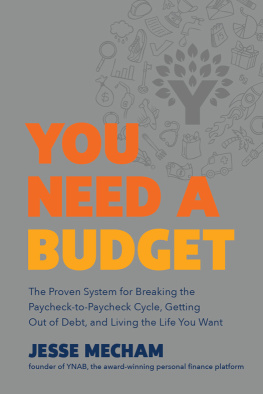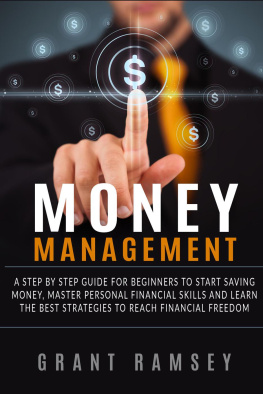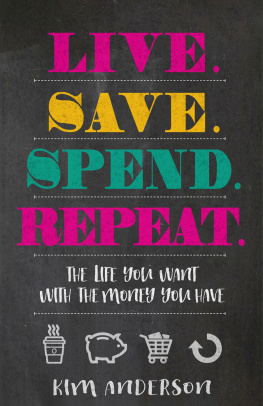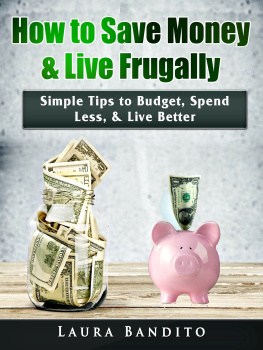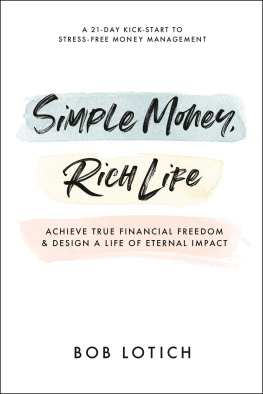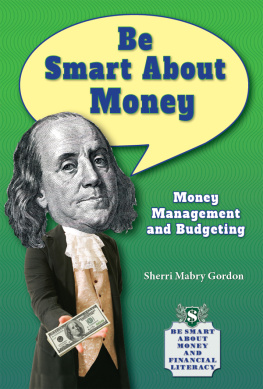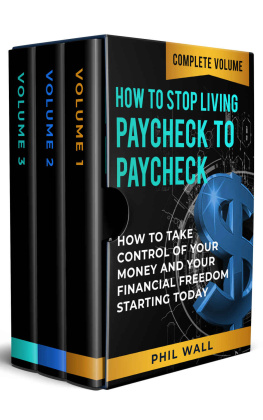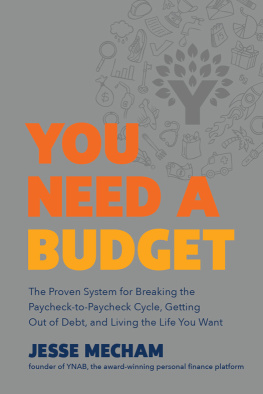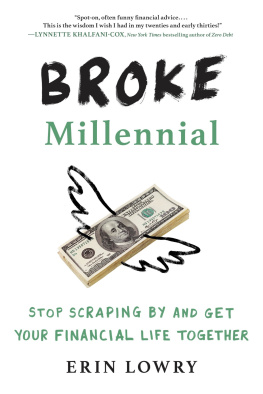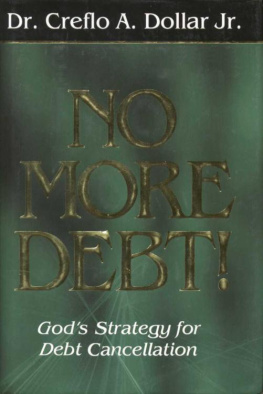For Julie... and the six other small people
who live in our house.
I f youre reading this book, money stresses you out in some way. For some of you it might be pull-your-hair-out stress. For others, maybe you just know your money situation isnt as good as it could be. Whether were panicking or just feeling uneasy, money thoughts interrupt our peace of mind all the time, on so many levels. We usually dont even notice it happening.
You grab a $6 turkey sandwich at work, and while standing at the register you think of the stack of cold cuts in your fridge at home. Should have gotten up earlier to pack lunch, you think. You read an article about how your generation isnt saving enough for retirement and wonder if you should up your 401(k) contribution. You save to remodel the bathroom and still worry its the wrong move because your laptop is about to croak, the dog has a funny limp, and the growing rate of college tuition has us all thinking we should be eating beans between now and the time our kindergartners go to college. That tight feeling hits your chest, your breathing gets a little shallow, and you just chalk the stress up to your busy schedule.
Those little stress daggers are actually the same question on repeat: Can I afford this? And this can be as small as lunch out with friends, all the way up to retirement. The question haunts all of us, all the timewhether were wealthy or broke, were always wondering if we can afford something.
The only money question that rivals Can I? is its evil cousin: Should I? This one is partly fueled by our competitive nature, but mostly by not knowing what we really want. A colleague shares that he puts something away for his kids college every month, and you wonder if you should do the same. Your cousin Instagrams her familys epic Disney trip (highlights reel only) and you think, Should I go on vacation?
Should I? always loops back to Can I?, keeping that anxiety bubbling so we know we need to do somethingwere just not sure what, or when, or what were even capable of.
Most of us feel paralyzed by this point and end up doing nothing, usually for one of three reasons:
Were not confident we know what is best. Were overwhelmed by options and have no idea whether to trust our gut, the guy yelling at us on TV, or something else entirely.
We dont have a system for making decisions. Ill talk a lot about this throughout the book, but the bottom line is that we need a system in place to drive our decisions. Without one, were spending and saving on whims.
Were scared to learn the truth. Our finances are a black box. Money flies in and out of our accounts, and we guess were doing fine because the balance never hits zero, but we have no idea whats truly going on. And were afraid to find out.
What to do? How can you break the paralysis with so many factors keeping you in neutral? Thats what this book will help you figure out. And my first, biggest piece of advice may jolt you out of any financial impasse:
Forget about the money.
Seriously. Because its not about the money. Okay, its about money a little bit. But money is not the point, not the end goal. In truth, when were stressed about our finances, its because were not sure our money decisions are aligned with the life we want to be living.
The question we need to ask ourselves isnt Can I? or Should I? Its What do I want my money to do for me? Answering this question will help us cope with endless options, pressure to keep up with the Joneses, and the paralyzing fear that were just not being smart with our money.
What do I want my money to do for me? works like a gut check that helps us see whether our priorities are driving our money decisions. When we know what we want our money to do for us, the options become a lot less daunting, and confidence quickly replaces the stress.
Gut Check: Go
What do I want my money to do for me?
In all the time you devote to working, spending, saving, and stressing, have you ever asked yourself this question?
Dont worry if you havent. Most of us dont think about money in this way, and honestly, its a hard question to answer. Not only that, but its normal for your answer to change over time. Thats why you need to keep doing the gut check with each money decision. It will either confirm your priorities or open your eyes to necessary changes.
Let me be clear: What do I want? and What do I want my money to do for me? are different questions. Im not prompting you to write your holiday wish list. What do I want my money to do for me? is about nothing less than deciding what kind of life you want to live, and then making a plan so your money can help you get there.
If youre not already living the life you want, how would you like to live instead? Dont worry if your answer is radically different from your current reality. Just think about whats important to you. Maybe the life you want involves staying home with your kids, annual European vacations, going back to school, or just less stress around bills. It could be all of those things. It doesnt matterthe point is to decide what your priorities are, and then make a plan to meet them.
Without a plan, youre floating and stumbling, hoping life will someday click into place. Its a lot like going to college and never choosing a major (maybe you did that), or going grocery shopping and grabbing random things on the shelf hoping theyll add up to dinner (maybe you do that). This is actually how many of us treat our money. It just comes and goes without much thought until suddenly we are stressed, and we often dont even realize were stressing about money. Everything just feels overwhelming.
The Antidote to Your Money Stress
That little life plan? Its actually a budget. Yes, a budget. You need one. I need one. We all need a budgetno matter how much money we have (or dont have). You picked up this book, so you probably already know that, but the idea of budgeting may still scare you. If youre worried it will be too rigid, restricting, and unforgiving, its time to look at budgeting from a different angle. Forget about the things you cant do with your money (I cant afford that trip), or the things you have to do with your money (I have to pay off my student loans). Instead, think of what you want, and go from there. I want to take my family to Italy. I want to live debt-free.I want to hire a personal tutor to learn Italian. A budget lets you plan for all of these things.
I mentioned earlier that many of us struggle with money choices because we dont have a system for making decisions. Your budget is that system. Its a tool for designing your life around what you want. Without a budget you have no way to prioritize your spending. You often dont even know where your money is truly going. You may stress about not being able to afford whats important to you while you simultaneously spend on things youd willingly nix if you could see the trade-offs. Thats the beauty of a (good) budget: it lets you see exactly how your spending affects the rest of your life.
Perhaps that trip to Italy seems beyond your reality. Meanwhile, the takeout habit you barely enjoy costs you hundreds a month. You might fill your closet with eBay impulse buys you rarely wear while you cringe at your student loan balance.
If youve been wondering how youll ever afford to (fill in the blank), you may not have to look as far as you think. This is what makes budgeting actually fun and liberating. Theres nothing like the joy of zapping meaningless expenses and putting those dollars toward something that once seemed like a pipe dream. Imagine seeing your vacation fund grow while your waistline shrinks (double whammy!), or seeing your student debt disappear as your clutter subsides.

